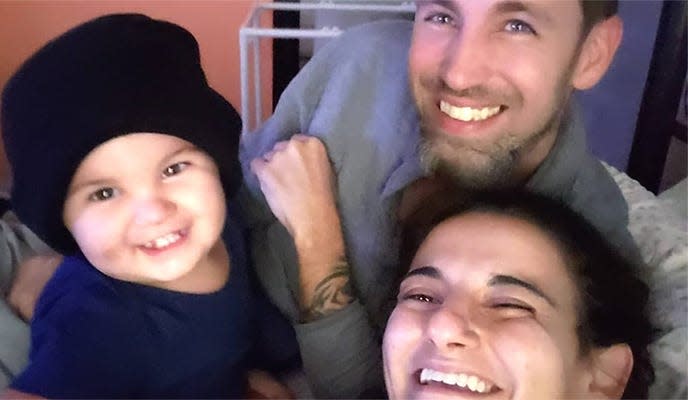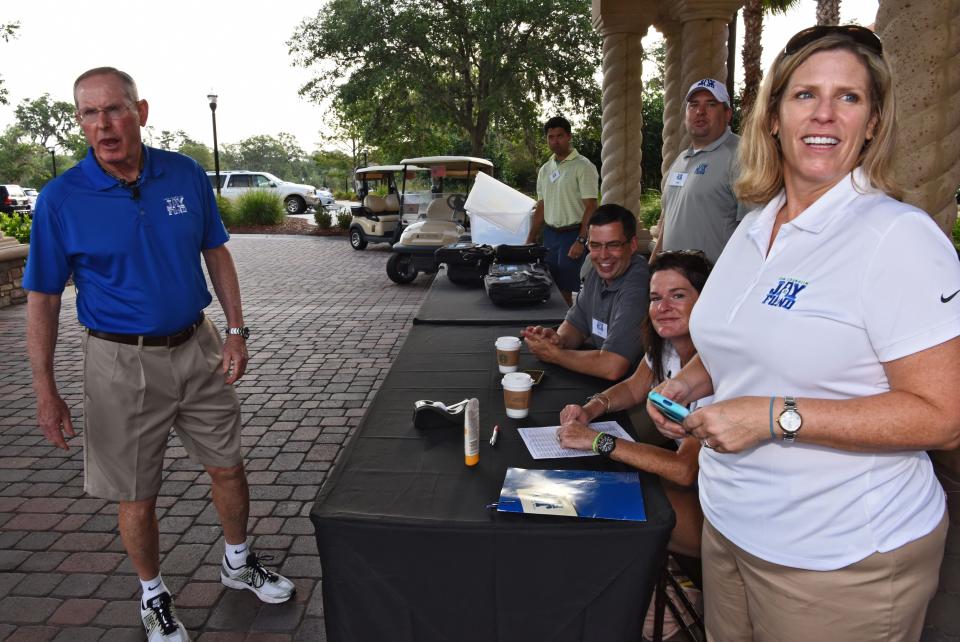Caring for the caregivers: How Tom Coughlin's journey taking care of his wife inspired Jay Fund's new program
- Oops!Something went wrong.Please try again later.
Bryce Moceri was a perfectly healthy almost-3-year-old boy growing up in Jacksonville until that terrifying day in July 2021 when he woke up and stared blankly at his mother but did not say a word.
For Bryce not to speak was unusual.
"I remember turning the TV on for him and he just grabbed my face and stared me in the eyes and hugged me so tight. He repeated this three times," his mother, Mary Moceri, said.
Later he acted as if he could not breathe, then as if he was drowning, then as if he was going to throw up.
Child health: Jacksonville's Nemours unveils new name, logo and plan to lead 'transformation' of children's health care
Wolfson Children's Hospital: Tower gives Wolfson room to grow in Jacksonville
"He was reaching for the ceiling. At this point I am begging him to speak to me, to say something, to look at Mommy," she said. "He looked the opposite direction and started making weird jaw and mouth motions."
As Moceri and her three other children headed out of their Jacksonville home to get Bryce to a doctor, he started convulsing.
"This was the hardest day I have ever had," she said. "The emotions my heart and mind felt when I realized he was having a seizure in my arms are unexplainable."
Bryce was later diagnosed with a fast-growing, cancerous brain tumor.

Tom Coughlin: Coach turned caregiver
Tom Coughlin, former Jacksonville Jaguars and Super Bowl champion New York Giants coach, and daughter Keli Coughlin, executive director of his charity, the Jay Fund, are familiar with the helpless feeling Moceri experienced that day.
In 2021, Tom Coughlin announced his wife of 54 years, Judy, had been diagnosed with progressive supranuclear palsy, an incurable brain disorder that affects the ability to walk, speak, think and control body movements. Symptoms began occurring three years prior, the diagnosis was made in 2020 and his wife's condition had slowly deteriorated.
Judy Coughlin: Wife of former Jaguars coach Tom Coughlin, suffering from incurable brain disorder
"We’ve helplessly watched her go from a gracious woman with a gift for conversation, hugging all the people she met and making them feel they were the most important person in the room, to losing almost all ability to speak and move," Coughlin wrote in a New York Times essay.
He became her primary caregiver, with the support of the couple's four children and 11 grandchildren.
"I've learned firsthand caregiving is all-consuming," Coughlin wrote. "It is mentally and physically exhausting. Sometimes you just need a break. When Judy is having a good day, then my day is good.
"But then there are dark days — those days that are so full of frustration and anger, they have me feeling like a failure and pondering the unfairness of the disease," he continued. "I've spent my entire life preparing for some of the biggest games a person could play, but nothing can prepare you to be a caregiver who has to watch a loved one slip away."

He encouraged everyone caring for a loved one to take a break when they need it and don’t be too hard on themselves. It’s not easy, he wrote, "and for all those wondering how they can help, it’s simple: Don’t forget about the caregivers."
What Coughlin has learned about caregiving infused a new program offered by the Jay Fund, which he founded in 1996 to provide financial, emotional and practical support for families tackling childhood cancer. The charity was named in honor of Jay McGillis, a college player he coached who died of leukemia. It operates in Jacksonville and the New York/New Jersey area, where Coughlin led his respective NFL teams.
Gene Frenette: From NFL's sideline to wife's bedside, Tom Coughlin delivers powerful message for caregivers
Mark Woods: A good time to say something nice about Tom Coughlin
Adding a caregiving program was "already in the works" thanks to a family that supports the charity, Keli Coughlin said.
"They asked our staff to brainstorm areas of support that are needed but that the Jay Fund wasn’t currently focused on," she said. "Increasing support for caregivers was the top idea. As we were developing what a formal program 'Caregiver Care' would look like, my mom’s health was declining and my dad became her caregiver."

Launched in 2021, the program addresses caregivers' physical health, nutrition, self-care and relationships, she said.
"Research shows that if a caregiver has support and their well-being is taken care of, the patient’s overall well-being is positively impacted," Coughlin said. "We have all heard the safety instructions on an airplane, you have to put your mask on before you can help others."
The program is "another way the Jay Fund can be there for families tackling childhood cancer. Parents gain support to keep going," she said.
Jay Fund helps parents 'be there' for their ill children
The Jay Fund and its caregiving program have been a virtual life raft for Moceri, her husband, Mike, and their family that also includes Isabella, 9, and Aislynn and Brooks, 7.
That terrifying day in July was followed by a multitude of medical tests, biopsies, scans and on Sept. 24 a diagnosis: a central nervous system embryonal tumor. Then came long hospital stays and series after series of what Bryce's oncologist called "one of the toughest regimens" of chemotherapy.
"I think I cried anytime no one was around, for the first three months," Mary Moceri said. "I now just try my best to stay positive. There are those days that just sneak up on you and completely wipe you out. Emotionally, mentally, physically."
Guest column: Caregiver issues like depression, isolation, and burnout are becoming urgent
Guest column: Help ElderSource prioritize needs of older adults, the disabled and caregivers
From Oct. 7 to Dec. 30, Bryce spent 65 days hospitalized.
"We had so many ups and downs and unfortunately our stays at the hospital weren't so cut and dry," Mary Moceri said. "There have been extremely scary moments where I just begged and pleaded with God to just please get us past this hump. … There have been a few times that I truly didn't think he was going to pull through."

Mike Moceri's work as a self-employed, often out-of-town semi-truck driver provides the family's sole income. But he had to stop working so one parent could stay with Bryce when he was hospitalized and one parent could be at home with their other three children.
TV host reveals: Nick Cannon's 5-month-old son dies from brain cancer
'No one on this earth like Dick Vitale': Broadcaster's fight against childhood cancer continues
The couple was already in a crash course of caregiving, and the loss of income added financial stress. But the Jay Fund not only supported them as caregivers but kept the family financially afloat, Mary Moceri said.
"It has opened a network for us to be able to time-out the craziness going on," she said. "They've provided us with healthy meals while we are at the hospital. Although we haven't had the chance to, they have invited us out to a few of their different events structured for the caregivers."
And so much more, she said.
"We simply wouldn't be able to be there for our children if it wasn't for the Jay Fund," she said. "When you hear your child has a very rare, very malignant … brain tumor, you have no idea what the days, weeks, months and even years to come will look like. We simply had no other option other than having Mike quit his job. Which meant we just went from consistent weekly income to no income. If it weren't for Jay Fund, we would be homeless, without a vehicle and probably a complete mess.
"They have graciously assisted us monthly with a lot of our bills since day one. When you are watching your child fighting for their life, the last thing you need on your shoulders is financial stress," Moceri said.

The Jay Fund delivered holiday packages for Thanksgiving and Christmas, sent Bryce's siblings to an event to make gingerbread houses and enrolled them in a Museum of Science & History camp. The nonprofit also started a grant for siblings of oncology patients to receive counseling sessions.
"I mean they have thought of everything," Moceri said. "They have taken so much burden off of our shoulders."
Finding a cure
One thing the Jay Fund cannot do on its own is to find a cure for children's cancer. Moceri has become an advocate for more research funding.
A "measly" 4 percent of the federal budget for cancer research is dedicated for pediatric cancer, she said. But this year an estimated 10,470 children will be diagnosed with cancer and 1,050 will die from the disease, according to the American Cancer Society.
"That's not fair to any child that has lost their life to cancer," Moceri said. "So many diagnosed at such a young age, that all they know is the cancer lifestyle. Together we can request and demand changes. What would you do if it was your child?"
The treatment has shrunk Bryce's tumor by 90 percent, with two more series of chemotherapy to go. He is also awaiting a bone marrow transplant.
Bryce, his mother said, "has been a trooper."

"I explained to Bryce that he had a 'boo-boo in his head that Mommy and Daddy couldn't make better," she said. "That is why we have to be in the hospital and all the doctor appointments in-between. He understood it almost instantly. We just try to keep happy faces and fun distractions going as much as possible."
Bryce has had rough days from the illness as well as side effects from the treatment. "Chemo brain" can lead to behavioral issues, Moceri said.
'Fighting brain cancer is personal': Ponte Vedra foundation gives $3.6 million to researchers
"He can be in the best mood and with no notice or warning he can go into these rage fits," she said. "But he mostly maintains a positive attitude. He is so full of life. For the most part, he has just blown me away. He is my biggest hero."

He also is close to his three siblings, who have rallied by his side.
"It's so hard as a parent to see your child unable to leave the bed … let alone being a child and having to see your baby brother go through all of that," his mother said. "They truly have been troopers right along with Bryce."
Caregiving: 24-hour-a-day job
Since the onset of Judy Coughlin's illness, her family walked in the shoes of caregivers.
"We have learned what love, dedication, commitment, selflessness all mean on a much deeper level," Keli Coughlin said. "This is a 24-hour-a-day job with few breaks and it’s emotionally, mentally and physically taxing.
"Each family walks their own journey, but it does make it more relatable for me to personally imagine what parents of kids with cancer are going through," she said. "It has taught our family to treasure the moments together. I am glad part of what the Jay Fund does is work to provide families with special times together to make positive and special memories."
Friends and family can help too.
"If you know someone who is a caregiver, give them a break. Figuratively and actually," Coughlin said. "Offer to bring a meal, sit with the loved one so they can do something for themselves. And understand the stress the caregiver is under, it’s a tough, tough time."
bcravey@jacksonville.com, (904) 359-4109
TOM COUGHLIN JAY FUND
To donate, seek services or get more information, contact the Jay Fund at P.O. Box 50798, Jacksonville Beach, FL 32240 or go to tcjayfund.org.
This article originally appeared on Florida Times-Union: Tom Coughlin's Jay Fund charity adds caregiver program

